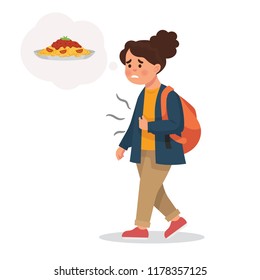เคยส่งสัยไหมครับว่า ตอนที่เราหิว เกิดอาการท้องร้อง หรือ growling stomach (n - โกรลิง สทัม'มัค) หรือ empty-feeling stomach (n - เอมที ฟีลลิง สทัม'มัค - รู้สึกท้องว่าง) ความหิวเกิดจากอะไร ผมเคยเข้าใจว่าเกิดจากเพราะว่าท้องเราว่าง แต่รู้ไหมครับผมเข้าใจผิดมาตลอดเลย อยากรู้ไหมครับว่าจริงๆแล้วความรู้สึกหิว ที่ภาษาอังกฤษเรียกว่า hunger (n - ฮัง'เกอะร์) เกิดจากอะไร ไปหาคำตอบกันครับ let find the answer together
WHAT MAKES US HUNGRY? อะไรทำให้เราหิว
When we need food, our body begins to crave for it. But how do we know that we are feeling "hunger"? How does our mind get the message and make us feel "hungry"?
เมื่อเราต้องการอาหาร ร่างกายของเราเริ่มที่จะ crave (v - เครพ - กระหาย) มัน แต่เราจะรู้ได้อย่างไรว่าเรารู้สึกหิว เราได้รับสัญญาน(สาร)ว่าเราหิวได้อย่างไร
Hunger has nothing to do with an empty stomach, as most people believe. A baby is born with an empty stomach, yet it doesn't feel hungry for several days. People who are sick or feverish often have empty stomachs without feeling hungry.
การหิวจริงๆแล้วไม่เกี่ยวกับ ท้องว่าง หรือ empty stomach (n - เอมจิ สทัมมัค) อย่างที่หลายๆคนเชื่อเลย เด็กทารกเกิดมาพร้อมกับท้องว่างแต่ไม่รู้สึกหิวเลยตั้งหลายวัน บ่อยคนป่วยท้องว่างแต่ก็ไม่รู้สึกหิว
Hunger begins when certain nutritive materials are missing in the blood. When the blood vessels lack these materials, a message is sent to a part of the brain that is called the "hunger center"
ความหิวเริ่มเมื่อขาด miss (v - มิส - สูญเสีย หาย) สารอาหารบางอย่างในเลือด เมื่อหลอดเลือด (blood vessel - n - บลัด เวสเซิล) ขาดสารชนิดนี้ จะมีสัญญาน(ข้อความ)ส่งไปยังสมองที่เรียกว่า ศูนย์(ควบคุม)ความหิว
This hunger center works like a brake on the stomach and the intestine. As long as the blood has
sufficient food, the hunger center slows up the action of the stomach and the intestine. When the food is missing from the blood, the hunger center makes the stomach and intestine more active.
ศูนย์(ควบคุม)ความหิวนี้ทำงานคล้ายๆกับเบรกระว่างท้องกับลำใส้ intestine (n - อินเทส'ทิน - ลำใส้) ถ้าเลือดยังมีสารอาหารพอเพียง ศูนย์(ควบคุม)ความหิวก็จะลดการทำงานระหว่างท้องกับลำใส้ลง แต่เมื่อไหร่ที่สารอาหารไม่พอเพียงศูนย์(ควบคุม)ความหิวก็จะกระตุ้นการทำงานระหว่างท้องกับลำใส้ให้ทำงาน
That's why a hungry person often hears his stomach "rumbling." When we are hungry, our body doesn't crave any special kind of food, it just wants nourishment. But our appetite sees to it that we don't satisfy our hunger with just one food, which would be unhealthy.
นั้นเป็นเหตุผลที่คนที่หิวมักจะได้ยินเสียงท้องของเขา ร้องโครกคราก rumble (v - รัม'เบิล - ส่งเสียงคางยาว [ท้อง]ร้อง) เมื่อเราหิวร่างกายจะไม่ได้อยากกินอาหารจานพิเศษไดๆเลย หากแต่ต้องการแค่สารอาหาร nourishment (n - เนอ'ริชมัน - อาหาร สารอาหาร) แต่ความอยากอาหาร appetite (n - แอพ'พิไททฺ - ความอยากอาหาร) ของเรากลับเห็นว่า see to it (v - ซีทูอิท - เห็นด้วย เห็นว่า) เราไม่ได้ทำให้ความหิวหายไป satisfy (v - แซท'ทิสไฟ - ทำให้พอใจ) เพี่ยงเพราะอาหารประเภทเดียว ซึ่งนั่นคงไม่ดีต่อสุขภาพ
เมื่อเราต้องการอาหาร ร่างกายของเราเริ่มที่จะ crave (v - เครพ - กระหาย) มัน แต่เราจะรู้ได้อย่างไรว่าเรารู้สึกหิว เราได้รับสัญญาน(สาร)ว่าเราหิวได้อย่างไร
Hunger has nothing to do with an empty stomach, as most people believe. A baby is born with an empty stomach, yet it doesn't feel hungry for several days. People who are sick or feverish often have empty stomachs without feeling hungry.
การหิวจริงๆแล้วไม่เกี่ยวกับ ท้องว่าง หรือ empty stomach (n - เอมจิ สทัมมัค) อย่างที่หลายๆคนเชื่อเลย เด็กทารกเกิดมาพร้อมกับท้องว่างแต่ไม่รู้สึกหิวเลยตั้งหลายวัน บ่อยคนป่วยท้องว่างแต่ก็ไม่รู้สึกหิว
Hunger begins when certain nutritive materials are missing in the blood. When the blood vessels lack these materials, a message is sent to a part of the brain that is called the "hunger center"
ความหิวเริ่มเมื่อขาด miss (v - มิส - สูญเสีย หาย) สารอาหารบางอย่างในเลือด เมื่อหลอดเลือด (blood vessel - n - บลัด เวสเซิล) ขาดสารชนิดนี้ จะมีสัญญาน(ข้อความ)ส่งไปยังสมองที่เรียกว่า ศูนย์(ควบคุม)ความหิว
This hunger center works like a brake on the stomach and the intestine. As long as the blood has
sufficient food, the hunger center slows up the action of the stomach and the intestine. When the food is missing from the blood, the hunger center makes the stomach and intestine more active.
ศูนย์(ควบคุม)ความหิวนี้ทำงานคล้ายๆกับเบรกระว่างท้องกับลำใส้ intestine (n - อินเทส'ทิน - ลำใส้) ถ้าเลือดยังมีสารอาหารพอเพียง ศูนย์(ควบคุม)ความหิวก็จะลดการทำงานระหว่างท้องกับลำใส้ลง แต่เมื่อไหร่ที่สารอาหารไม่พอเพียงศูนย์(ควบคุม)ความหิวก็จะกระตุ้นการทำงานระหว่างท้องกับลำใส้ให้ทำงาน
That's why a hungry person often hears his stomach "rumbling." When we are hungry, our body doesn't crave any special kind of food, it just wants nourishment. But our appetite sees to it that we don't satisfy our hunger with just one food, which would be unhealthy.
นั้นเป็นเหตุผลที่คนที่หิวมักจะได้ยินเสียงท้องของเขา ร้องโครกคราก rumble (v - รัม'เบิล - ส่งเสียงคางยาว [ท้อง]ร้อง) เมื่อเราหิวร่างกายจะไม่ได้อยากกินอาหารจานพิเศษไดๆเลย หากแต่ต้องการแค่สารอาหาร nourishment (n - เนอ'ริชมัน - อาหาร สารอาหาร) แต่ความอยากอาหาร appetite (n - แอพ'พิไททฺ - ความอยากอาหาร) ของเรากลับเห็นว่า see to it (v - ซีทูอิท - เห็นด้วย เห็นว่า) เราไม่ได้ทำให้ความหิวหายไป satisfy (v - แซท'ทิสไฟ - ทำให้พอใจ) เพี่ยงเพราะอาหารประเภทเดียว ซึ่งนั่นคงไม่ดีต่อสุขภาพ
For instance, it would be hard for us to take in a certain amount of nourishment all in the
form of potatoes. But if we eat soup until we've had enough, then meat and vegetables until we've had enough, then dessert until we've had enough, we can take in the same quantity of food and enjoy it!
ยกตัวอย่างเช่น มันค่อนข้างยากที่เราจะได้รับสารอาหารจำนวนหนึ่งได้ทั้งหมดจากมันฝรั่งเพียงอย่างเดียว แต่ถ้าเรากินซุบจนพอ เนื้อและผักจนพอแล้วกินของหวานจนพอ เราจะสามารถกินอาหารได้ปริมาณเท่าๆกันอย่างมีความสุข
How long can we live without food? That depends on the individual. A very calm person can live longer without food than an excitable one because the protein stored up in his body is used up more slowly.
ถ้าไม่กินอาหารคนเราจะอยู่ได้นานเท่าใหร่ คำตอบคือ ขึ้นอยู่กับแต่ละคน คนที่ใจเย็นจะสามารถอยู่ได้นานกว่าคนที่ตื่นเต่นง่าย ซึ่งเป็นเพราะโปรตีนที่อยู่ในร่างกายของของคนที่ใจเย็นจะถูกนำไปใช้จนหมด use up (v - ยูส อัพ -ใช้จนหมด)ได้ช่ากว่านั่นเอง
From: The Big Book Of Tell Me Why
https://www.seattletimes.com/life/wellness/hunger-vs-thirst-are-you-eating-when-you-should-be-drinking/









